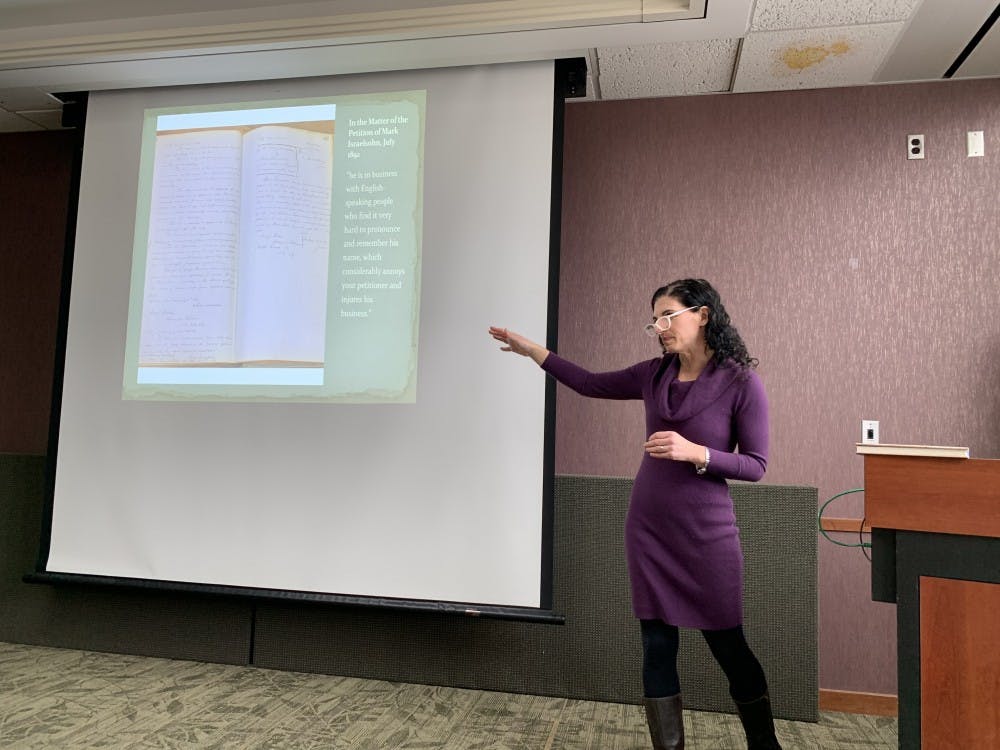With a focus on research she was largely unable to use in her book, Kirsten Fermaglich — an associated professor of history and jewish studies at Michigan State — gave a seminar on the history of name changing in the United States, specifically within the Jewish community.
This was the first seminar of the calendar year for the Center for Gender in Global Context, or GenCen's colloquia series. The center has been holding these colloquia for about a decade.
In October 2018, Fermaglich published, “A Rosenberg by Any Other Name," diving deep into the topic of name changing, specifically during the early to mid 1900s. She touched on her book as well as additional research during the colloquium entitled, “I'm the sole provider and caretaker: gender, class and name changing in New York City, 1892-2012."
“It's a very, very dominant male activity, mostly for business men, mostly interested in improving their chances of making their businesses look better — most of them are Jewish," Fermaglich said, "and so they're looking for less Jewish sounding names."
Fermaglich provided information on the many different paths that legal name changes have taken during the past 120 years, specifically during the World War I and II eras, when it became more necessary and required for women to have jobs. However, the legal name changes did not stop then.
“By the early 21st century name change, petitions had become more significant as avenues for gender and familial reconstruction,” Fermaglich said. “Working class single mothers, upper middle class, newlywed mothers, women and transgender and non-binary people of many different racial and class backgrounds were among the most typical of name change petitioners in New York City by the second decade of the 21st century.”
For men, the process was significantly easier, Fermaglich said. However, for women, there were different roadblocks that existed when it came to both retaining a maiden name or later changing a last name after marriage.
“Before the 1970s in the U.S., there were basically a whole host of state laws and customs that basically insisted that women take on their husbands laws and subjected them to penalties, like not being able to vote, not being able to sit on juries, all kinds of things if you didn't take your husband's name," Fermaglich said.
The colloquia series centers around seminars that focus on gender and sexuality. The topic of Fermaglich’s seminar drew in a crowd of several colleagues and students. When the floor was open to questions, several attendees offered comments that helped expand on the ideas presented.
“I thought it was a theoretically interesting talk that offered new ideas about the changing ways that name changing occurs in U.S. society,” Assistant Professor of Sociology Stef Shuster said.
Fermaglich’s research has also helped uncover that vast numbers of name changes have occurred over the past several decades years.
“As a sociologist, to get to hear about the historical research ... it's really interesting because the kinds of research questions she's asking, the data that she's digging into, in the way that she handles running into different obstacles, the kind of analysis that she's able to do out of it, it’s new and innovative,” Stephanie Nawyn, an associate professor of sociology and co-director of academic programs for the Center of Gender in Global Context, said.
Fermaglich will be hosting two additional seminars later in the semester. A book discussion will take place on Feb. 22 from 3:30 p.m. to 5 p.m. in 256 Old Horticulture. "Islamophobia and Muslim Name Changing in the US after 9/11" will be held on March 28 from noon to 1:30 p.m. in room 303 of the International Center.
Support student media!
Please consider donating to The State News and help fund the future of journalism.
Discussion
Share and discuss “Seminar on the 'history of name changing' kicks off 2019 colloquia series” on social media.







